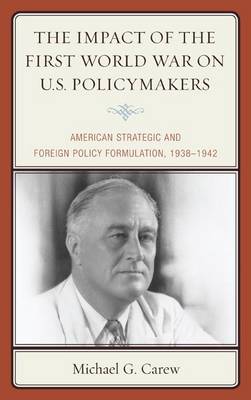The Impact of the First World War on U.S. Policymakers: American Strategic and Foreign Policy Formulation, 1938-1942 is designed to recount the formulation of foreign and defense policies through an examination of the background of the policymakers, with specific emphasis on the World War I experience. The introduction provides an analysis of the literature of the history of this American World War II policy formulation. The events and factors that led to the reorientation of priorities in 1938-1939 are examined. From that base, Michael Carew reviews the unfolding events of the European and Japanese degeneration into war through the spring of 1940, and their perception for the American policy-makers. He also recounts the tectonic shifts of the subsequent eighteen months and the scramble for an American response. The immediate consequences of Pearl Harbor brought the policymaking to a crisis, and the Casablanca conference of January 1943 signified the completion of the formulation of American foreign policy and naval-military strategy. Carew emphasizes the leadership of President Roosevelt and his cadre of planners in the policy formulation realm, the assertion of leadership of the alliance, and Roosevelt's specific tasks in managing the American war effort. These presidential tasks included the industrial mobilization of the American economy, the domestic political leadership of the war, the persuasion of the alliance to the propriety of American policy, and the defeat of the Axis.
- ISBN10 0739190490
- ISBN13 9780739190494
- Publish Date 18 July 2014 (first published 1 January 2014)
- Publish Status Active
- Publish Country US
- Imprint Lexington Books
- Format Hardcover
- Pages 336
- Language English
